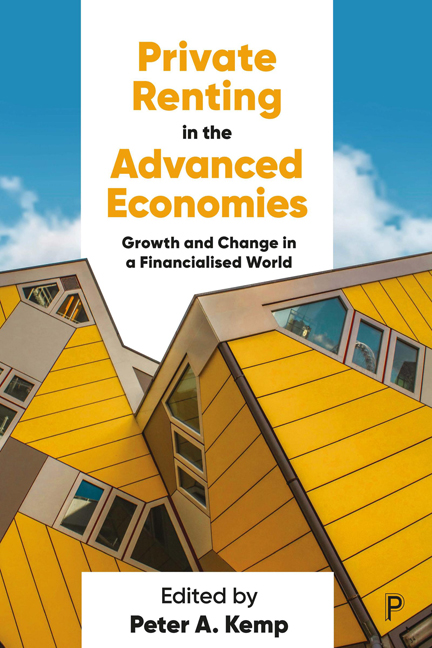Book contents
- Frontmatter
- Contents
- List of figures, tables and boxes
- List of abbreviations
- Notes on contributors
- Preface
- 1 New trajectories in private rental housing
- 2 Growth and change: private renting in Australia in the 21st century
- 3 Rental housing dynamics and their affordability impact in the United States
- 4 The Irish rental sector and the post-homeownership society: issues and challenges
- 5 Private renting in England: growth, change and contestation
- 6 Private renting in the Netherlands: set to grow?
- 7 Suppressive regulation and lower political esteem: private renting in Germany at the beginning of decline
- 8 Private renting in Denmark: foreign investors in the crosshairs
- 9 Norway: booming housing market and increasing small-scale landlordism
- 10 Private rented markets in Spain and housing affordability
- 11 The short-run impact of COVID-19 on the private rented sector
- 12 Change and continuity in private rental housing
- Index
4 - The Irish rental sector and the post-homeownership society: issues and challenges
Published online by Cambridge University Press: 03 April 2024
- Frontmatter
- Contents
- List of figures, tables and boxes
- List of abbreviations
- Notes on contributors
- Preface
- 1 New trajectories in private rental housing
- 2 Growth and change: private renting in Australia in the 21st century
- 3 Rental housing dynamics and their affordability impact in the United States
- 4 The Irish rental sector and the post-homeownership society: issues and challenges
- 5 Private renting in England: growth, change and contestation
- 6 Private renting in the Netherlands: set to grow?
- 7 Suppressive regulation and lower political esteem: private renting in Germany at the beginning of decline
- 8 Private renting in Denmark: foreign investors in the crosshairs
- 9 Norway: booming housing market and increasing small-scale landlordism
- 10 Private rented markets in Spain and housing affordability
- 11 The short-run impact of COVID-19 on the private rented sector
- 12 Change and continuity in private rental housing
- Index
Summary
Introduction
The Irish housing system has undergone tremendous change over recent decades. In addition to the turmoil of the property boom and bust associated with the global financial crisis (GFC), it has also witnessed a long-term decline of homeownership and social housing, a growing share of households in private rental accommodation, almost a decade of record rent inflation, and a chronic homelessness crisis. Indeed, for many years now housing has rarely been absent from the newspaper headlines and was among the most important issues for voters in the most recent general election. For most of the 20th century housing outcomes improved steadily. In the 21st century this trend appears to have been reversed.
These changes can be conceptualised in terms of the transition from a ‘homeownership society’ to a ‘post-homeownership society’ (see Ronald and Kadi, 2017). For most of the post-war era, Ireland was a quintessential homeownership society, reaching some of the highest rates of homeownership in Europe. Homeownership was engrained, not just in housing policy, but also politically and culturally. Homeownership supports throughout this period acted as a social leveller by facilitating access to affordable and secure housing for a wide spectrum of households, including the working class. Because of the central role of the state in housing, Norris (2016) has characterised Ireland during this period as a ‘property-based welfare state’.
The transition to a post-homeownership society, characterised by the growth of the private rental sector (PRS), has, in contrast, transformed the housing system into a key driver of inequality for an increasing number of households. Homeownership continues to be the dominant tenure, and roughly half of all homeowners are mortgage-free. Most commentators would agree that homeownership is also the most culturally dominant tenure. According to survey data, for example, the overwhelming majority of PRS tenants continue to aspire to homeownership (Corrigan et al, 2019). The term ‘post-homeownership’, then, should not be taken to mean that homeownership no longer plays a central role within the housing system. Instead, it refers to the erosion of the structures which generated majority homeownership, and consequently the growing difficulty faced by households in accessing homeownership and the related prevalence of the PRS (Ronald and Kadi, 2017; see also Forrest and Hirayama, 2015).
- Type
- Chapter
- Information
- Private Renting in the Advanced EconomiesGrowth and Change in a Financialised World, pp. 69 - 90Publisher: Bristol University PressPrint publication year: 2023



